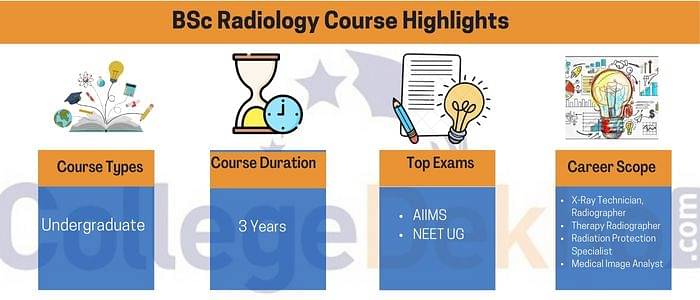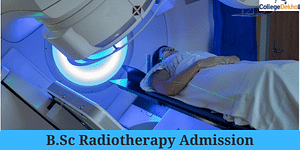BSc Radiology
BSc Radiology Overview
Bachelor of Science in Radiology (BSc Radiology) is a three-year undergraduate degree program that focuses on using medical imaging technology for diagnosis and treatment. The BSc Radiology subjects and syllabus is generally determined by the individual university or college offering the course. However, most universities will cover similar subjects and topics in the field, with additional subjects they deem appropriate for better knowledge. Some of the BSc in Radiology subjects include Radiography apparatus, Human anatomy, Pathology and physiology, Radiography for medical use, Processing techniques for images, Advanced imaging modality instruments Echography and Doppler and many more topics. Apart from these subjects, universities may also define certain credit requirements like project and dissertation submissions as well as elective subjects to earn the degree at the end of the course. The program typically lasts three to four years and provides students with a strong foundation in:
- Medical imaging technology
- Radiographic procedures
- Patient care
- Anatomy and physiology of the human body
- Radiation safety
- Image interpretation
BSc Radiology is a specialized field within the broader discipline of medical imaging. It is one of the best paramedical courses for students who want to have a medical practice in diagnostics using radiation technology. BSc Radiology covers a range of paramedical subjects and topics are covered. BSc Radiology admission 2024 is based on both merit and entrance based. The average course fee for BSc Radiology varies from INR 10K - 1 LP (depending upon the institute).
To pursue a successful career in Radiology, you must have a keen eye for detail, excellent research skills, the ability to interpret technical data, and the ability to use radiography equipment with extreme precision. Following the completion, candidates can pursue BSc Radiology jobs such as X-Ray Technician, Radiographer, Therapy Radiographer, Radiation Protection Specialist, Medical Image Analyst, etc. Candidates can expect BSc Radiology salary ranges between INR 2-6 LPA.
Table of Contents
- BSc Radiology Overview
- BSc Radiology Course Highlights
- Who should do a BSc Radiology Course?
- Why Choose BSc Radiology?
- What is the Difference Between BSc Radiology vs BSc Radiography?
- Types of BSc Radiology Courses
- BSc Radiology Eligibility Criteria
- BSc Radiology Entrance Exams
- BSc Radiology Course Admission Process in India
- Direct BSc Radiology Admission Process Without Entrance Exam
- BSc Radiology Fee in India
- BSc Radiology Syllabus and Subjects
- Best Books for BSc in Radiology Course
- Top Private BSc Radiology Colleges in India
- Top Government BSc Radiology Colleges in India
- BSc Radiology Top Colleges in India
- Career Options After BSc in Radiology
- Courses After BSc in Radiology Degree
- BSc Radiology Scope in India
- FAQs about B.Sc Radiology
BSc Radiology Course Highlights
The table below illustrates the highlights involved in a BSc Radiology course -
| Name of Degree | BSc in Radiology |
|---|---|
| Type of Degree | Undergraduate |
| Duration of Degree | 3 years |
| Entrance Exams | AIIMS, NEET UG |
| Eligibility Criteria | 10+2 in Science stream with Physics, Chemistry, Biology, and Mathematics |
| Admission Procedure | Entrance Exam/Merit-Based |
| Cutoff | Highest - 720 marks (NEET) Lowest - 147 marks (NEET) |
| Fees for the Entire Course | INR 10,000 - INR 10 lakhs (depending on the university) |
| Average Salary | INR 2 - 6 LPA |
| Job Profiles | X-Ray Technician, Radiographer, Therapy Radiographer, Radiation Protection Specialist, Medical Image Analyst |
| Top Recruiters | AIIMS, Columbia Asia, Apollo Hospital, CMC, Medanta, Fortis Hospital, Manipal Hospital |

Who should do a BSc Radiology Course?
Candidates must know why they should even go for a BSc in Radiology course when there are other programmes available in the healthcare sector. To give a proper understanding, given below are the types of candidates who should do a BSc Radiology course:
- Candidates who are interested in working in the healthcare sector or the medical industry, but do not want to deal with the requirements it takes to become a doctor or pursue a nursing career
- Candidates who want to pursue a career in the radiology department of a hospital or nursing home, working on X-Rays, MRIs and so on
- Candidates who have interest in diagnosing diseases by looking at the scan reports of patients can consider a BSc in Radiology as a viable programme
- Candidates who might someday want to work in the archaeology industry where MRI and other imaging techniques have high importance
- With a BSc in Radiology, candidates can also work in the forensic department of any crime branch. Candidates who are interested in assisting the police can also look into radiology as a viable career option
Benefits of Studying BSc Radiology
Professional graduates of the BSc Radiology course are able to treat patients and identify diseases with the help of medical imaging. They are able to assist other medical practitioners in their diagnostic procedures. Studying the undergraduate degree in Radiology will enable to students to gather knowledge about the latest practices and updated technology that are used in this field.
Why Choose BSc Radiology?
An entryway into the medical field without having to dedicate several years of intensive research and studying in the field of medicine, BSc Radiology is perfect for those who find themselves squeamish with certain aspects of medicine. This along with many other elements are some of the reasons why you should choose BSc Radiology as the course of choice for higher studies. Outlined here are some of these reasons why BSc in Radiology is the course for you:
- High Demand: With a growing need for medical support in a country with well over a billion people residing, the demand for skilled and qualified radiologists continues to grow. Therefore, the career opportunities in the field are immense for skilled and qualified radiologists.
- Increasing Technological Advancements: With a growing need for Radiology in the medical sector, innovations and advancements are continuously being made to make Radiological processes more efficient and effective, requiring highly skilled and qualified professionals.
- Industry Growth: With an increasing demand for radiologists and technological advancements, experts claim that the industry is expected to grow at a rate of 8.7% from 2020 to 2027.
- Varying Career Prospects: Graduates of a BSc Radiology course will be able to choose from a range of job roles, not only in the medical sector but also in forensic sciences, allowing them the opportunity to expand their career prospects.
- Good Salary Packages: While the initial salary package may leave much to be desired, however, a skilled and qualified radiologist will be able to quickly climb the career ladder and earn good salary packages with a few years of experience
- Opportunity to Run a Clinic: Unlike many paramedical roles, Radiologists will be able to run their radiology clinics, allowing them to become vendors to numerous hospitals. However, huge investments will be required to acquire the proper equipment to run a profitable clinic.
The benefits of becoming a radiologist are multi-fold, both from an academic and professional standpoint. However, to become the best in the field, graduates will need to expand their knowledge and skills by earning the right skills and qualities that make them crucial to the medical sector.
What is the Difference Between BSc Radiology vs BSc Radiography?
BSc in Radiology and BSc in Radiography are both three-year undergraduate programmes which deal with imaging, scanning and medical analysis of the same in order to diagnose a patient in the best way possible. There are, however, certain key differences in the two fields. BSc in Radiography ensures that you get proper training in the ways to handle all medical imaging equipment such as X-Rays, MRI Scanners, Sonographs, Fluoroscopes, Ultrasound Scanners, PET Scanners and so on. This field of study does not require too much talent or specialisations and the risks involved are minimal at large.
BSc Radiology, on the other hand, is not only concerned with the medical imaging equipment but also deals with the diagnosis of a patient. Therefore, candidates who study BSc in Radiology are almost equivalent to a specialised doctor profession who are liable to diagnose patients and recommend further recourse. This field of study requires talent and is at large, a bit riskier.
| Parameters | BSc in Radiology | BSc in Radiography |
|---|---|---|
| Duration | 3 years | 3 years |
| Syllabus | Physiology, Basic Science Anatomy, Radiobiology, Radiation Physics, Principle and Practice of Radiotherapy | Biochemistry, Computed Tomography, Imaging Techniques, Microbiology, Pathology, Physiology, Radio diagnosis |
| Admission Process | Merit-based/Entrance Exams | Merit-based/Entrance Exams |
| Course Overview |
|
|
| Average Salary (for freshers) | INR 2-6 LPA | INR 2-5 LPA |
| Job Opportunities | Radiology Expert / Imaging Technician / Nuclear Medicine Technologist / Radiologist Technician | All diagnostic centres and hospitals require radiographers |
Also Read: Part Time Language Courses at DU
Types of BSc Radiology Courses
There are mainly 3 types of radiology courses that are offered in India - Full time Radiology courses, Part time Radiology courses and Online radiology courses. Due to the steady rise in the demand for radiology courses, several universities and colleges have introduced this course to their curriculum. There is expected to be a boom in the healthcare sector over the next couple of years. More and more radiologists and imaging technicians will be required by 2024, enabling lots of aspirants to get stable jobs in the radiology industry. This will propel many students interested in the medical and paramedical stream to seek admission in the top BSc in Radiology colleges in India.
| Type of Radiology course | Details |
|---|---|
| BSc in Radiology - Full Time Course |
|
| BSc in Radiology - Online Course |
|
| BSc in Radiology - Distance Course |
|
BSc Radiology Eligibility Criteria
Candidates should know the eligibility requirements for the BSc in Radiology Course before applying to any institution and pursuing a career in this field. The eligibility requirements for a BSc in Radiology are as follows:
The minimum eligibility criteria for pursuing the BSc Radiology course are as follows:
| Academic Requirements |
|
|---|---|
| Admission Requirements | Applicants must pass the entrance examinations like NEET UG that are conducted at the national level in order to take admission to BSc Radiology courses |
| Age Limit | The minimum age of the applicants while applying for admission to BSc Radiology courses in India is 17 years as of 31st December of the applying year |
Required Skills for BSc Radiology
There are certain skills that will help students pass their BSc in Radiology course with flying colours. The required skills when it comes to a BSc in Radiology Course are as follows:
Observational Skills: One of the most important skills for a radiologist - students must be able to observe all the details in reports and through medical imaging equipment to provide the best results.
Organisational Skills: One must make sure that they are good at management because haphazardly kept reports and scans can prove dangerous for patients.
Problem-solving Skills: Radiologists will be listening to people’s physical ailments and problems a lot. Hence, being understanding and finding solutions is in the job description.
Interpersonal Skills: A radiologist might have to calm patients down or provide hope, while maintaining their professionalism and doing their job to the best of your abilities.
Analytical Skills: Looking at reports and making an accurate diagnosis through proper analysis is a must for every radiologist.
Research Skills: Not everything will be present in the textbooks that one must have read. Therefore, it is important to be able to conduct research when dealing with a difficult situation.
Medical Knowledge: Having some basic medical knowledge is a must for every radiologist.
BSc Radiology Entrance Exams
Several universities offer admission to their BSc in Radiology programmes based on entrance examinations administered by the respective institutions or at the national level. Here is the BSc in Radiology entrance examination mentioned below:
| Exam Name | Date | Details |
|---|---|---|
| CUET | May 15 - May 31, 2024 | CUET stands for Common University Entrance Test. It's a national-level exam that tests students' knowledge and skills. The National Testing Agency (NTA) conducts CUET to grant admission to various programs at participating universities and colleges across India. |
| NEET UG | May 5, 2024 | National Eligibility Requirements Entrance Test is a national-level exam used to provide admission to the country's top medical institutions. Several BSc in Radiology Colleges accept NEET Exam scores as admission criteria for their BSc in Radiology and Imaging Courses. |
| AIIMS | July 2024 | The AIIMS entrance exam for BSc in Radiology Courses is administered by the All India Institute of Medical Sciences. The results of the entrance exams are required for admission to the BSc in Radiology, MSc in Radiology, and other courses. This is one of the most prestigious entrance exams for admission to the best BSc in Radiology Colleges in the country for the BSc in Radiology Course. |
BSc Radiology Course Admission Process in India
BSc in Radiology admissions are undertaken in a way similar to other medical degree courses. There are two types of admission processes for a BSc in Radiology course. The first one includes the merit-based admission process where universities that offer a BSc in Radiology programme let candidates get admitted in the undergraduate course via the marks they secured in their 10+2 from a recognised board and institution. The second is admission to the undergraduate course in Radiology through entrance examinations available at various institutes or on a national level.
BSc Radiology Course Merit-Based Admission
The following are some of the pertinent points required for admission in BSc Radiology based only on merit:
- For merit-based admissions, candidates need to provide academic transcripts like their Class 12 board exam certificates and scorecards.
- Candidates must have cleared their class 12 board exams in the stream of science, with a focus on Physics, Chemistry, Biology and Mathematics.
- Some universities may consider participation in extra-curricular activities as a positive towards the candidates.
- Some universities may conduct a personal interview and/or group discussion as part of the selection process.
It is important to read the admission guidelines and processes of each university before submitting the application form, in order to enhance the chances of successful admission.
BSc Radiology Course Entrance-Based Admission
The following are some of the pertinent points required for admission in BSc Radiology based on the entrance examinations that are conducted:
- Some BSc Radiology courses may require entrance tests scores like AIIMS and NEET UG scores at many popular universities and colleges in India. However, some colleges may conduct their entrance exams for admissions or even accept state-conducted entrance test scores.
- Candidates must prepare and appear for the test on the scheduled date and time to expand their university options.
- Depending on the selection process of the university, candidates will either be selected based on a cut-off score or a selection process defined by the individual university.
- Candidates will also need to meet the basic eligibility criteria for BSc in Radiology, i.e. Class 12 graduates in the stream of science (PCM-B), earning a minimum of 50% aggregate in the board exams.
Each institution accepting applications via entrance test scores will define the additional selection criteria that applicants will have to clear to successfully enrol in their desired course.
Also Read: Best Certificate Courses in India
Direct BSc Radiology Admission Process Without Entrance Exam
Most colleges and universities based their admissions to BSc Radiology programmes on merit. A written 10+2 exam, a series of in-person interviews, and/or a qualifying exam relevant to the programme will determine which candidates are accepted into the BSc Radiology programme. Under such circumstances, candidates are usually selected on the basis of their academic standing and their results on a prior relevant exam.
BSc Radiology Fee in India
BSc Radiology fee varies from INR 10,000 - 1,00,000. However, depending on a number of factors, different colleges have different course fees for their BSC in Radiology degree programmes. The type of institution, or whether it is private or public, the kinds of equipment available, the state in which the college is located, and other college facilities are some of the factors determining the BSc in Radiology course.
| Type of Institution | Fee Range (in INR) |
|---|---|
| Government BSc Radiology Colleges | 10,000 - 1,00,000 |
| Private BSc Radiology Colleges | 1,40,000 - 3,00,000 |
BSc Radiology Syllabus and Subjects
Before selecting any BSc Radiology course, it is important to find out the syllabus and subjects that each course is set to cover under the curriculum. While most universities and institutions offering the course would cover the same subjects, each university reserves the right to include additional subjects it deems necessary for the growth and development of the student. Here are the BSc Radiology syllabus and subjects that aspirants would have to study after enrolling in their desired course.
Common BSc Radiology Subjects
All BSc in Radiology courses will cover a range of subjects which will be common, regardless of the university or institution offering the course. Some of these subjects include:
- Principles of Medical Imaging
- Medical Biochemistry
- Radiographic Technique
- Para-Clinic Training
- Human Anatomy
- Radiation Physics
- Radiographic Equipment
- Quality Control
- Diagnostic Radiology and the Drugs
- Community Healthcare
- Health and Indigenous Population
BSc in Radiology Syllabus
Apart from the common subjects, as outlined above, students may cover the following syllabus and subjects for BSc Radiology within six semesters of the course. Check out the table below to understand the subjects and syllabus commonly seen in BSc Radiology courses:
| First Semester | Second Semester |
|---|---|
| Pathology | Fundamentals of Radiology and Computer Science |
| Anatomy | General Radiography |
| Physiology | Radiation Hazards and Protection |
| Generation and Properties of X-Ray | Personality Development and Communication Skills |
| Third Semester | Fourth Semester |
| CT Scan 1 | Environmental Science |
| General Radiography 2 | MRI 1 |
| Ultrasound | Organisational Behaviour |
| Fifth Semester | Sixth Semester |
| MRI 2 | Human Resources |
| Nuclear Medicine and PET Scan | Intervention in Diagnostic Radiology |
| CT Scan 2 | Anaesthesia in Diagnostic Radiology |
| Doppler and Echography | - |
Best Books for BSc in Radiology Course
The following are some of the best books for those who wish to pursue a career in the field of radiology. These include:
Book | Author |
|---|---|
Unofficial Guide to Radiology: 100 Practice Abdominal X-Rays | Daniel Weinberg |
Grainger & Allison’s Diagnostic Radiology: The Spine | Jonathan H Gillard |
Textbook Of Radiology Physics | Singh Hariqbal |
Diagnostic Radiology, 3-Volume Set: A Textbook of Medical Imaging | Ronald G. Grainger MB ChB |
Textbook Of Radiology Physics | Singh Hariqbal |
Top Private BSc Radiology Colleges in India
Some of the best private colleges in India to complete BSc Radiology course are as follows:
| College/University | Average Course Fee | Location |
|---|---|---|
| Saveetha Medical College and Hospital, | INR 2,50,000 to INR 5,00,000 | Kanchipuram |
| Santosh Group of Allied Health Sciences | INR 1,55,000 to INR 3,00,000 | Ghaziabad |
| Sri Guru Ram Das University of Health Sciences | INR 1,00,000 to INR 3,00,000 | Amritsar |
| Shree Guru Gobind Singh Tricentenary University | INR3,55,000 to INR 5,00,000 | Gurgaon |
| Noida International University | INR 2,70,000 to INR 5,00,000 | Greater Noida |
Note: The fees mentioned above are subject to change.
Top Government BSc Radiology Colleges in India
List of the top government colleges to study BSc Radiology are:
| College/University | Average Course Fee | Location |
|---|---|---|
| Shree Guru Gobind Singh Tricentenary University | INR 1,00,00 to INR 2,00,000 | Gurgaon |
| Uttar Pradesh University of Medical Sciences | INR 80,000 to INR 90,000 | Saifai |
| AIIMS | INR 10,000 to INR 12,000 | Delhi |
| Indira Gandhi Medical College and Hospital | INR 35,000 to INR 50,000 | Shimla |
Note: The fees mentioned above are subject to change.
BSc Radiology Top Colleges in India
Recent developments in the world of medical imaging technology and radiology have opened up a wide space for more and more recruitments. This has led to several students from all over India to opt for the 3 year undergraduate degree in Radiology and its applied fields. Several BSc in Radiology Courses have opened up in colleges all over the country, in states like Maharashtra, Uttar Pradesh, Madhya Pradesh, New Delhi, West Bengal, Karnataka, Tamil Nadu and so on.
The following are some of the best BSc in Radiology Colleges in India where candidates can take admission in BSc in Radiology, along with their tuition fees.
| Name of the College | Location | Tuition Fees |
|---|---|---|
| AIIMS (All India Institute of Medical Sciences) | New Delhi | INR 10,775 (total) |
| Swami Vivekananda Institute of Engineering and Technology | Chandigarh, Punjab | INR 70,000 (annually) |
| Vivekananda Global University | Jaipur, rajasthan | INR 60,000 (annually) |
| CMC | Vellore, Tamil Nadu | INR 49,480 (total) |
| JIPMER (Jawaharlal Institute of Postgraduate Medical Education and Research) | Puducherry | INR 10,620 |
| Gulzar Group of Institutes | Ludhiana, Punjab | INR 55,000 (annually) |
| Swami Rama Himalayan Institute (SRHU) | Dehradun, Uttarakhand | INR 49,000 - INR 2,06,000 (total) |
| NIHER | Patna, Bihar | NA |
| Om Paramedical and Technical Education (OPTE) | New Delhi | INR 30,000 (annually) |
| Sri Sathya Sai Medical College and Research Institute, (SSSMCRI) | Kanchipuram, Tamil Nadu | INR 30,000 (annually) |
Career Options After BSc in Radiology
With a BSc in Radiology, radiology graduates have a plethora of career and employment options at fingertips. They can choose from a wide range of careers, such as those in physiotherapy, radiation protection, X-ray technology, and more. However, not every graduate begins earning money from work right away. A few of these skilled learners decide to go for a radiology master's degree. The syllabus provides the students with such extensive training that they are already equipped with the skills necessary to be successful in the radiography industry. It offers the candidate numerous valuable chances to apply the knowledge they have acquired over the course of the three-year programme. BSc Radiology jobs such as Therapy Radiographer, Diagnostic Radiographer, Radiation Protection Specialist, and many others are offered to them.
They work in fields like mammography, tomography, bone densitometry, cardiovascular interventional radiography, and angiography. The typical starting salary for graduates is between INR 2-6 LPA. However, it has been noted that earnings in private hospitals and organisations are typically higher than those in public hospitals.
The following is a list of some of the job profiles that the candidates selected: along with their average annual salary tabulated below:
| Job Profile | Job Description | Average Salary |
|---|---|---|
| Radiation Protection Specialist | Their job entails evaluating and testing X-Ray machines and equipment, as well as inspecting the areas where they are used. | INR 4-5 LPA |
| Physiotherapist | They are involved in assisting patients with movement or physical disabilities caused by various diseases or injuries. | INR 3-4 LPA |
| Diagnostic Radiographer | They use radiation in the form of X-rays and ultrasounds to examine and diagnose a variety of diseases and injuries. | INR 1-2 LPA |
| X-Ray Technician | They operate x-ray machines in hospitals to continue taking X-rays of patients. | INR 1-2 LPA |
| Therapy Radiographer | Their primary responsibility is to work in the oncology department of any hospital, where they use radiation therapies to treat cancer patients. | INR 3-6 LPA |
These are some of the most popular careers that BSc Radiography students frequently select. They can, however, also succeed in other job profiles within the same industry. They can also choose to pursue a Postgraduate degree in radiography, which will boost their academic background and increase their value. Students who are interested in pursuing this field of study further may choose an MSc, or even a PhD. After completing their studies, graduates are qualified to work as lecturers in reputable institutions.
BSc Radiology Salary
Graduates in Radiology have a lot of opportunities now when it comes to career options as illustrated above. They can work in clinics, nursing homes, hospitals, labs and so on. The average salary that can be expected depends on work experience, skills, grades and more.
| Work Experience | Salary (per annum) |
|---|---|
| 0-1 year | INR 3 LPA - INR 3.2 LPA |
| 1-3 years | INR 3.7 LPA - INR 4.5 LPA |
| >5 years | INR 5.1 LPA - INR 6 LPA |
BSc Radiology Recruiters
Following are some of the top BSc Radiology recruiters:
- AIIMS
- Columbia Asia
- Apollo Hospital
- CMC
- Medanta
- Fortis Hospital
- Manipal Hospital
Courses After BSc in Radiology Degree
Although a BSc in Radiology provides a solid grounding in the field, you should consider PG courses to gain specialised knowledge in a particular area. Here are a few well-liked postgraduate programmes in Radiology after a BSc in Radiology:
- MSc Radiology
- MSc Medical Radiation Physics
- PGD in Radiotherapy Technology
- PGD in X-ray Radiography
- PGD in Ultra-Sonography
- Master of Magnetic Resonance Technology
- Master of Radiopharmaceutical Science
- Master of Medical Radiation – Nuclear Radiation
BSc Radiology Scope in India
Graduates of the BSc Radiology programme have many career options in the medical field, including positions as radiologists, technicians, medical image analysts, and radiographers. Depending on their job roles, they can find employment in labs, hospitals, and the healthcare industry.Following their completion of the BSc Radiology course, students may choose to pursue graduate work in pertinent fields, such as a Masters of Science or a Doctorate. Graduates can find employment in a variety of other scientific fields outside of medicine. The need for skilled workers in the field is anticipated to increase as our reliance on imaging technology grows.
Lastly, for those who have an interest in technical work and wish to pursue a career in medicine, the BSc Radiology course is highly recommended. Furthermore, many find it to be an all-around interesting career due to the combination of technical and medical. You can choose from a wide range of jobs in the medical industry after finishing the course, including sales representative, radiologist, and CT technologist.
Popular Courses
FAQs about B.Sc Radiology
What are the best BSc Radiology entrance exams?
NEET, AIIMS, NIMHANS, VMU CEE, and other entrance exams are some of the most prestigious.
Why do people go into radiology?
Radiology continues to outperform other medical specialties in terms of technological advancements due to advancements in medical imaging technology. Thus, pursuing a career in radiology would put you in the hot seat, interacting with and utilising such groundbreaking advanced technologies, as well as helping patients more effectively.
Which is preferable, BPT or BSc radiology?
Now for the better option it is believed that physiotherapy is superior to radiology and imaging technology because bachelor's degrees in physiotherapy allow for self-employment, and after completing your bachelor's degree in physiotherapy, you can pursue a master's degree with a specialisation for a better career.
Is radiology a stressful profession?
Radiology can be a stressful field because your work affects the quality of life for others. Disease diagnosis is difficult, and you bear a lot of responsibility for correctly diagnosing your patients. Furthermore, informing them on a regular basis that they have a serious illness can be taxing.
Is there a future for radiology?
As the medical sector grows exponentially, the demand for qualified and skilled radiologists has also been increasing at a similar rate. Radiologists play a crucial role in identifying and diagnosing illnesses and challenges in a patient, thus, cementing the career prospects of BSc Radiology graduates. Moreover, graduates can explore outside the medical arena and even look into forensic sciences.
Is there a lot of math in radiology?
As an analytical field, requiring high proficiency in technical, scientific and medical knowledge, an extremely high grasp of mathematical understanding is also important. Therefore, candidates who find mathematics hard but are interested in a career in Radiology must take up tuition or extra classes for mathematics to improve their understanding of various mathematical concepts, theorems and equations.
Is BSc radiology suitable for girls?
Because there aren't any emergencies like there are in paediatrics and gynaecology, radiology is a good field for women to work in because it allows for more flexible schedules. Radiologist pay is comparable with experience and training.
Which is better, B Pharm or Radiology?
To determine the better course between B.Pharm and Radiology, candidates must first define their requirements for the higher education degree they wish to pursue. Both B.Pharm and Radiology offer excellent career opportunities for graduates, however, the pharmaceutical industry is known to be extremely lucrative. Graduates of both fields would earn similar salary packages initially and witness hikes with experience.
Is NEET required for BSc radiology?
No, NEET is not required for the BSc Radiology programme. Admission to this course is determined by various colleges' eligibility criteria. Some colleges admit students based on their 10+2 grades, and then they release merit lists. Some colleges use an Entrance Examination to determine admissions.
Is a BSc in radiology a good career path?
Radiology offers a plethora of career opportunities. The demand for radiographers has increased as medical science and technology have advanced. You can look into a wide range of job opportunities in both the public and private sectors that will help you succeed in life.
Is BSc radiology a doctorate?
No, a BSc in Radiology does not qualify as a doctorate. It is an undergraduate course that leads to jobs in machine operation, but becoming a doctor requires completion of the MBBS course. An MBBS degree is required to become a radiologist or a Doctor of Radiology.
Who are the top employers for BSc graduates in radiology?
From government and private hospitals to pathology and radiology clinics, as well as forensic science firms and even the crime branches of police departments, BSc Radiology graduates can be employed in a number of organisations. Among the top employers for BSc in Radiology graduates are AIIMS, Columbia Asia, Apollo Hospital, CMC, Medanta, Fortis Hospital, and numerous others.
What programmes can I pursue after earning a BSc in radiology?
There are various academic programmes that BSc in Radiology graduates can pursue after graduation. These courses include MSc in Radiology, MSc in Medical Lab Technician, various PGDs in related fields and much more. Graduates can also venture into MBAs and other business-oriented courses to learn managerial and entrepreneurial qualities that can allow them to monetise their skills, knowledge and qualifications.
Is an MBBS degree needed to pursue BSc in Radiology?
No, an MBBS degree is not needed to pursue a BSc Radiology course, since the course itself is an undergraduate degree, also seen as a paramedical course. However, much like the MBBS degree, students must have cleared their Class 12 board exams in the Science stream. Those with a NEET score may find it easier to enrol in their desired BSc Radiology course.
Which universities offer the best BSc Radiology programmes?
Hundreds of institutions and medical colleges offer a BSc in Radiology course, some of which include AIIMS, Uttar Pradesh University of Medical Sciences, Saveetha Medical College and Hospital, Santosh Group of Allied Health Sciences, Noida International University, Rajiv Gandhi University of Health Sciences, University College of Medical Sciences, and many more.
How much does the BSc Radiology course fee?
The course fee of the BSc Radiology programme varies depending on the college. The typical course fee ranges from INR 10,000 to 2 lakh rupees.
What is the typical salary for BSc Radiology graduates?
The typical salary for BSc Radiology graduates will vary according to the job role they get as well as the experience they hold for the role. However, initially, a BSc in Radiology graduate can expect to earn anywhere between INR 1 LPA and INR 3 LPA, which may increase to INR 4 LPA on employment at a private firm/hospital. With experience, BSc Radiology graduates can expect to earn upwards of INR 7 LPA.
Is BSc Radiology a good programme to pursue?
Yes, BSc Radiology is a good programme to pursue as the degree trains and qualifies students for a career in medicine and/or forensic sciences. As the demand for skilled and qualified radiologists increase, the career prospects for graduates also increase, not only in India but abroad as well. Students can also turn to academia and research after graduation, which also holds immense potential.
What is the average BSc Radiology course fee in India?
The average BSc Radiology course fee in India can range from INR 20,000-10,00,000 per course, however, this will depend on the type of institution you have enrolled in, as well as the demand for the course at a particular university, among other parameters. For instance, government colleges will significantly be cheaper than private institutions in offering a BSc in Radiology course in India.
What are the admission requirements for the course?
The admission requirements for BSc in Radiology will vary between different institutions offering the course. However, in general, applicants must have cleared the class 12 board examinations in the stream of science, scoring at least 50% in the exams. Applicants may also need to clear entrance exams to enrol in the desired course in India.
What exactly is a BSc in Radiology?
BSc in Radiology is a three-year undergraduate degree programme that covers a range of elective and core subjects pertaining to human anatomy, pathology and physiology as well as the radiological concepts currently in practice in the world. Graduates of the course can find themselves qualified for a range of job roles in the medical field as well as forensic sciences.
What are the entrance exams required for pursuing BSc in Radiology in India?
Primarily, there are only two entrance exams currently accepted for admission to BSc Radiology courses which are NEET and AIIMS entrance exams. However, some universities may also conduct their entrance exams, while, some state universities may even consider state-conducted entrance tests for admission to the different BSc Radiology courses in India.
Which country is cheaper when it comes to studying radiology abroad?
The United Kingdom has a moderate fee range when it comes to studying radiology abroad at a reputed institution.
Which are two of the top BSc in Radiology Colleges in India?
There are several universities that are considered the best for the field, however, two of the top BSc in Radiology colleges in India include AIIMS Delhi and JIPMER Puducherry. Other popular universities include CMC Vellore, Swami Vivekananda Institute of Engineering and Technology, NIHER, Gulzar Group of Institutes, Om Paramedical and Technical Education (OPTE) and many more.
Is clearing basic English proficiency exams a requisite to study BSc in Radiology abroad?
Yes, clearing basic English proficiency exams like TOEFL, IELTS, and so on are pertinent for admissions to BSc in Radiology courses abroad. However, universities and institutions may also accept alternate options such as the applicant’s English language score in their board exams or clearing English pathway programmes that determine a candidate’s language proficiency.
Related Questions
- Courses
- B.Sc in Radiology










